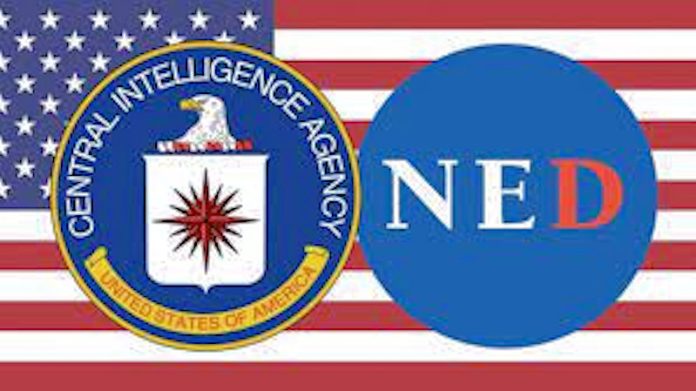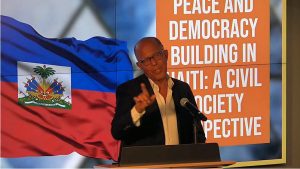
(Français)
Haiti is awash in money from the National Endowment for Democracy (NED).
The NED had a direct role in funding opposition forces and paramilitary forces leading up to the 2004 coup against democratically elected President Jean-Bertrand Aristide. It is crucial, therefore, to explore how the NED is currently influencing Haiti by funding “Haitian-led” organizations inside the country.
The NED is overt regarding the grants it provides and funding it delivers – you can simply visit their website and search. The organization is rarely analyzed, however, and their grantees are seldom scrutinized.
The National Endowment for Democracy
The NED was founded in 1983. The NED’s co-founder, Allen Weinstein, was described by the Washington Post as the “sugar daddy of overt operations.”
According to its website, the NED is “dedicated to fostering the growth of a wide range of democratic institutions abroad” including political parties, business organizations, human rights organizations, and “independent” media.
Weinstein was more honest in describing the NED’s purpose while speaking to the WaPo reporter: “A lot of what we do today was done covertly 25 years ago by the CIA,” he explained.

In Rogue State, author William Blum points out that while the NED was supposedly set up to “support democratic institutions throughout the world through private, non-governmental efforts,” the U.S. Congress provides nearly all of its funding.
Blum argues that while the NED claims to promote democracy abroad, it actually promotes U.S. foreign policy, often at the expense of democracy. The NED finances, nurtures, and supplies right-wing political groups, civic organizations, labor unions, student groups, book publishers, and “independent” media to further U.S. interests abroad.
These NED-funded organizations seek to destabilize left-wing governments whose policies oppose U.S. interests or prevent left-wing movements from successfully achieving power in the first place.
One cannot assume that a recipient of NED funding is somehow beholden to, or ideologically committed to, U.S. foreign policy. One can assume, however, that the goals and methods of organizations and individuals the NED funds do not oppose that of U.S. foreign policy. The U.S. government does not provide funding to individuals or organizations who oppose U.S. interests.
The NED’s History of Supporting Reactionaries in Haiti
The NED funded “civil society groups” to undermine President Jean-Bertrand Aristide in the years leading up to the 2004 coup d’état that removed him and hundreds of others from elected office.
Aristide won an overwhelming majority of 92% of the vote in the 2000 Presidential elections. His party, Lavalas also won 80% of the seats in the House of Deputies. It was then that the NED began funding opposition groups inside Haiti.
In Damming the Flood, author Peter Hallward describes how the NED, through its subsidiary, the International Republican Institute (IRI), helped fund a destabilization campaign against Aristide.
This destabilization campaign included funding an anti-Aristide coalition of political parties known as the Democratic Convergence (CD). Founded months after Aristide’s election victory in 2000, the NED funded this coalition of 200 political groups which wanted his government overthrown. Led by former Port-au-Prince mayor Evans Paul, CD included industrialists, bankers, importers, media, and intellectuals among its members.
Many CD members went on to become part of another U.S.-funded anti-Lavalas organization representing “civil society” – the Group of 184, headed by industrialist Andy Apaid Jr . Apaid funded paramilitary gangs who terrorized and murdered Lavalas supporters, while CD founder and IRI operative Stanley Lucas openly talked about assassinating Aristide in radio interviews.
Among the CD’s and Group of 184’s intellectuals was Ariel Henry, Haiti’s current de facto prime minister, who established early on his compliance with Washington’s imperial rule over Haiti. Magalie Comeau Denis , one of the leaders behind the Montana Group, a rival political coalition seeking to supplant him, was also associated with the CD.
Who is the NED Currently Funding in Haiti?
There are several “local civil society groups” and “human rights organizations” directly funded by the NED in Haiti right now.
Haiti-based human rights organizations the RNDDH (Reseau National de Defense des Droits Humains), Defenseurs Plus, Initiative de la Société Civile, and OCAPH (Observatoire Citoyen de l’Action des Pouvoirs Publics et des ONGs) are all funded by the NED.
The RNDDH and its director, Pierre Espérance, were instrumental in the propaganda campaign that framed Aristide as a dictator, despite having won 92% of the popular vote in 2000. In addition, the RNDDH manufactured reports that framed Lavalas Prime-Minister Yvon Neptune as having led an alleged massacre in La Scierie, near the town of Saint-Marc in Haiti.
the U.S. government is influencing organizations on multiple fronts in Haiti, including the human rights sector, the media, political parties, and civil society. But this is just the tip of the iceberg.
Espérance and the RNDDH worked closely with the Latortue dictatorship to target and jail thousands of Lavalas supporters. Before and after the 2004 coup, NCHR-Haiti (the National Coalition for Haitian Rights, the RNDDH’s former name) had an agreement with the head prosecutor in Port-au-Prince, by which any individual accused by Espérance and NCHR-Haiti would be subject to prosecution. According to a Council on Hemispheric Affairs (COHA) report, “countless individuals, many whose only crime was a loose affiliation with Aristide’s Fanmi Lavalas party, were arrested by the interim government based on false accusations entered by the NCHR-Haiti.”
Brian Concannon, director of the Institute for Justice & Democracy in Haiti, remarked at the time in an interview with The Jurist that NCHR-Haiti was a “ferocious critic” of Aristide’s government and an “ally” of the illegal regime.
He explained that “the persecution became so flagrant that NCHR-Haiti’s former parent organization, New York-based NCHR, publicly repudiated the Haitian group and asked it to change its name. [It then] changed its name RNDDH.”
Espérance and NCHR-Haiti received funding from the USAID, the NED, the French government, and the Canadian International Development Agency (CIDA) at the time.
The NED also funds several media organizations in Haiti such as AyiboPost and Jurimedia. Jurimedia’s executive director is Abdonel Doudou, a fellow at the NED. He is also a co-founder of the Citizen Observatory for the Institutionalization of Democracy (OCID), another NED-funded organization.
OCID uses its NED funding to offer a training program in “the monitoring and evaluation of public policies for executives of political parties and civil society organizations in Haiti.” According to OCID’s website, this program also aims to “strengthen the capacities of 500 actors from civil society and the Haitian political class in public policies.”
Furthermore, OCID aims to “mobilize the commitment of at least 30 political parties and 200 civil society organizations to advocate for the optimization of public policies and programs, particularly in the sectors of energy, corruption, and security.”
The NED also continues to fund the IRI’s programs in Haiti. IRI’s website claims they are “laying the groundwork for a new community radio program” in “target areas of the country.”
In short, the U.S. government is influencing organizations on multiple fronts in Haiti, including the human rights sector, the media, political parties, and civil society.
But this is just the tip of the iceberg.
The NED Conference: Peace & Democracy Building in Haiti
In July 2022, the NED hosted a conference where speakers shared their opinions on the crises facing Haiti. The speakers included Guy Serge Pompilus and Pierre-Antoine Louis of OCAPH, Carl Alexandre, MINUSTAH’s former #2, Fabiola Cordova, the NED’s Associate Director for Latin America and Caribbean, and Charles Clermont, the co-founder of Kafou Lespwa (Crossroads of Hope).
Like OCAPH, Kafou Lespwa is a “partner” of the NED, according to the moderators introductory remarks.
Fabiola Cordova had a direct role in funding numerous anti-Lavalas opposition-affiliated groups like the Group of 184 and the CD.
Career U.S. diplomat Carl Alexandre was the deputy chief the disastrous MINUSTAH military occupation force from 2013 to 2016.
Guy Serge Pompilus, the Senior Advisor for OCAPH, introduced the organizations “Manifesto for an Inclusive Dialogue” at the conference. The NED describe this manifesto as the result “of their collective efforts in devising innovative solutions for a peaceful and democratic transition in Haiti.”

The Manifesto itself is vague and offers no concrete strategies or solutions. It does, however, point to two “orientations” it promotes for Haiti: Kafou Lespwa and the American Global Fragility Act.
Kafou Lespwa (KL) is headed by co-founder Charles Clermont, a millionaire venture capitalist who has held high ranking posts at various financial institutions in Haiti.
The organization’s team includes a wide array of actors from Haiti’s political class, including members of PHTK, Lavalas, MTVayiti, and the Montana Coalition.
Two notable members are Danielle Saint-Lôt, Haitian Minister of Commerce, Industry and Tourism under the Latortue regime, and Clifford Apaid, son of Andy Apaid Jr.. Andy Apaid Jr. led the Group of 184, the “unarmed opposition” which worked in concert with armed paramilitary groups which terrorized Haiti in the lead up to the 2004 coup against Aristide. Other prominent team members include Fritz Alphonse Jean, the Montana group’s candidate for provisional President of Haiti, and Joel Edouard “Pacha” Vorbe, a member of Fanmi Lavalas’ executive committee.
Let’s review. The NED chose to bring together a Haitian millionaire venture capitalist partnered with the NED, two representatives of an NED-funded Haitian human rights organization that promotes U.S. intervention, the ex-Deputy Special Representative of the UN Secretary-General for MINUSTAH, a director at the NED who organized the funding – with U.S. tax dollars – of opposition groups who executed a coup d’état against Aristide and hundreds of other elected representatives.
The conference was organized in part to launch the Manifesto that promotes the American Global Fragility Act. The representatives of these Haitian-led organizations promoting U.S. intervention stood on the same stage as imperial agents like Fabiola Cordova and Carl Alexandre who have directly contributed to the destruction of Haitian democracy and sovereignty.
NED-funded “Haitian-led” organizations like KL and OCAPH serve the purpose of creating consensus among Haiti’s political class for the U.S. government’s foreign policy goal in Haiti: another American-led intervention in Haiti.
This intervention will be applied under the Global Fragility Act.
Enter the Global Fragility Act
The American 2019 Global Fragility Act (GFA) outlines a “peace building” strategy to “stabilize conflict-affected areas and prevent violence and fragility.” The Biden administration hopes the GFA will establish the United States as a “trusted partner — a force for peace and stability in the world.” The GFA emphasizes building relationships with “local civil society” by “strengthen[ing] the capacity of the United States to be an effective leader of international efforts to prevent extremism and violent conflict.” This “capacity” also includes “planned security assistance” over periods of ten years.
The GFA has received full support from both ruling-class parties – Democrat and Republican – and virtually all of the U.S. think-tanks which have opined on it. The Act also has the support of the Canadian government.
“Partnering” with Haiti under the Global Fragility Act
The Biden administration recently announced that Haiti is the first “partner” under the GFA.
Before this announcement, articles supporting the GFA focused on it as a vital tool for preventing “adversaries such as China and Russia to expand their influence.”
The GFA has less to do with “preventing violence and fragility,” and more to do with keeping Chinese investment out of so-called fragile states. The U.S. government is open about their desire to prevent China – and Russia – from securing access to raw materials and developing diplomatic relations and trade with nations under Washington’s sphere of influence. Specifically, in Latin America, the Caribbean, and Africa.
The push to implement the GFA is the U.S. government’s attempt to develop bilateral relations with so-called fragile states to gain access to key raw materials and prevent China from gaining “unwanted political leverage.” The Biden administration wants to ensure that the U.S. maintains “geopolitical leverage” in its sphere of influence, including Haiti, which has been reduced to neo-colony status since the 2004 coup.
Haiti is now a pawn in the U.S. government’s Cold War with China.
The intent of the prolonged, brutal depravation and cruelty the U.S. has imposed on Haiti since Jovenel Moïse’s assassination is to create the necessary conditions for a U.S. intervention under the GFA. This 10-year intervention will prevent Chinese trade and investment from entering Haiti, while also blocking historical allies like Venezuela and Cuba from offering aid and support.
The NED’s role in funding these various “Haitian-led civil society groups” and “human rights organizations” is to manufacture a consensus among the political class to accept the GFA, which will lead to a decade-long plan including “security assistance” which will be managed by the Defense Department under the supervision of the U.S. State Department and USAID.
In other words, an occupation of Haiti.
The terms “Haitian-led” and “local civil society groups” are emphasized by the various U.S. government-funded think-tanks who promote the GFA.
NED-funded organizations such as Initiative de la Société Civile and OCAPH have already endorsed the GFA. As momentum builds, more U.S.-funded “civil society” groups in Haiti are likely to endorse the GFA as part of a “Haitian-led” solution to the crisis in Haiti.
Creating Consensus for a Future “Partnership” with the U.S.
In early October 2022, Ariel Henry requested military assistance from the U.S., UN, and CORE group governments to suppress the citizen revolt against his unelected government.
The Montana group leaders responded, describing his request as “an act of treason” and said that “foreign troops would only make things worse,” according to a Reuters report. After meeting with Assistant Secretary of State Brian Nichols when he and his delegation visited Haiti, Ted Saint-Dic called for the resignation of PM Ariel Henry. Saint-Dic is a spokesperson for Montana, in addition to being one of the coalition’s leaders.
A weakened, compliant Montana coalition meets the criteria as a “Haitian-led civil society group” as defined in the GFA.
“History teaches us that no foreign force has ever solved the problems of any people on earth,” the Montana group leaders said in a statement, adding that Haiti instead needs support for its police force. “It is our Haitian police force that will have the ability to once and for all solve the insecurity problems that Haitians are experiencing.”
Montana leaders clearly do not want a military occupation force inside Haiti under Henry’s rule. The leaders were happy, however, to take part in a photo-op after meeting with Nichols. Pictures of Nichols, Comeau, and Saint-Dic smiling and shaking hands were shared on Twitter after their meeting. Blinken urged them to “urgently develop consensus on an accord.”
The Montana leaderships statement may seem at odds with a recent article by Saint-Dic for Just Security. In the article, Ted Saint-Dic argues that “U.S. officials should do everything in their power to seize this fragile opportunity to support and create space for Haitians engaged in an extraordinary effort to rebuild democracy.”
While not referring to the GFA directly, Saint-Dic says the U.S. has a “powerful and important role in helping get democracy back on track in Haiti.”
Saint-Dic goes further, however, seemingly requesting a military intervention on behalf of the Montana group when he states: the “United States should use creative and aggressive tactics to intercept criminal activity in Haiti.”
One can surmise that, from the perspective of Montana’s leadership, the problem isn’t U.S. and CORE group interference in Haiti’s affairs, but only that it is happening under Henry.
The “powerful and important role” the U.S. government has, in Saint-Dic’s view, is to “get democracy on track in Haiti” by recognizing the Montana group’s chosen interim President Fritz Alphonse Jean and interim Prime-Minster Steven Benoit. Saint-Dic’s invitation to the United States to “use creative and aggressive tactics to intercept criminal activity in Haiti” is a clear sign to the Biden administration that if they recognize Montana’s interim leaders, they would allow for some sort of “planned security assistance.”
Montana & the GFA
Henry is becoming increasingly unviable as a representative for the U.S. and CORE group in Haiti.
The various crises imposed on Haitians by the Washington and their CORE group allies over the past year have weakened the Montana coalition. This was likely the intent of the U.S. government’s support for Henry. The worsening situation in Haiti has also been used as a justification by Henry for requesting a military intervention.
The leaders behind Montana, however, have done nothing to mobilize support for Montana and force Henry from office since the Accord was first published.
Instead, Montana’s leaders have looked to Washington for legitimacy and support. Meanwhile, the limited public support Montana once enjoyed is crumbling.

In January 2022, Fanmi Lavalas withdrew its support from the leadership behind the Montana coalition. FL’s leadership stated its concerns that Montana leadership were “continuing with the election calendar without waiting to reach a broader and more solid consensus of civil society”.
In May 2022, MOLEGHAF, a Communist group, also withdrew support. In a recent interview , MOLEGHAF’s leader David Oxygène said that “after MOLEGHAF left the Montana coalition, the union CNOH (National Confederation of Haitian Workers) left, and many popular organizations no longer recognize the Montana Accord”.
Oxygène argues that Magalie Comeau Denis, and other leaders in the Montana coalition have been more interested in “holding meetings at the U.S. Embassy and even in the United States, so they could crush the popular movement.”
A weakened, compliant Montana coalition meets the criteria as a “Haitian-led civil society group” as defined in the GFA. If Montana leadership accepts a ten-year plan of U.S. “planned security assistance” on behalf of Haitians, this outcome is virtually guaranteed.
Montana & the GFA are Connected
Many of Montana’s leaders have already shown a tendency to comply with Washington’s dictates. This past compliance makes them ideal candidates as subordinates for Washington’s continued imperial domination of Haiti once Henry outlives his usefulness and is removed from power.
Haiti’s NED-funded organizations are creating a consensus among sectors of Haiti’s political class. This apparent consensus will be sufficient to convince foreign leaders – some of whom may be sympathetic to the plight of everyday Haitians – that Haitians truly want assistance under the GFA. The addition of support from “human rights” organizations like the RNDDH, OCAPH, the Bureau des Droits Humains en Haiti, and Defenseurs Plus will further cement this illusion of consensus.
The U.S. government does not fund organizations whose interests oppose their foreign policy goals. And one of the U.S. government’s primary current foreign policy goals in Haiti is to form a partnership under the Global Fragility Act.
Those who advocate for Haiti ought to recognize that organizations in and outside of Haiti which receive funding from the U.S. government via the NED or other imperialist organizations must be viewed as captured. Their interests either correspond with or do not challenge U.S. interests.
In a 2008 article, Nik Barry-Shaw described the consequences Western-backed NGOs had on Haiti’s middle and intellectual class in Haiti leading up to the 2004 coup against Aristide:
“The tremendous resources disposed of by these organization cannot but have a massive impact on the political scene, operating as they are amidst such extreme deprivation. If you want to get your daily bread, why bother building a powerful socio-political movement to press your demands on an impotent state?”
The waning desire for transformative social change competed for the middle-class’ heart with other, more individualistic interests. As Robert Fatton Jr. explains: “In a country where destitution is the norm and private avenues to wealth are rare, politics becomes an entrepreneurial vocation, virtually the sole means of material and social advancement for those not born into wealth and prestige.” Ironically, the political representatives of the middle class ultimately did the most to advance the neoliberal compromises forced on Aristide.
These sectors subsequently “turned to … generous funders of ‘civil society’ from the North.”
We must also scrutinize the claims of the middle and intellectual class who receive funds from the NED and other foundations based in the United States and other CORE group countries. We must also be prepared to reconsider the narratives that the leaders and representatives of these NED-funded institutions present regarding marginalized or villainized individuals or organizations inside Haiti.
We must interrogate these NED-funded institutions and their various reports, manifestos, and plans for Haiti because they in some way serve the interests of U.S. imperialist policies in Haiti.
An earlier version of this article was published by Black Agenda Report. Travis Ross is a teacher based in Montreal, Quebec. He is a co-editor of the Canada-Haiti Information Project. His articles have been published in Truthout, Haïti Liberté, and Rabble.ca. He can be reached on Twitter.










[…] Human Rights (RNDDH), which is also supported by Soros as well as the infamous CIA cut-out agency, the National Endowment for Democracy (NED). The best example of its disinformation recycling is the report’s exhumation of the […]
[…] (RNDDH), également soutenu par Soros ainsi que le tristement célèbre agence de la CIA : le National Endowment for Democracy (NED). Le meilleur exemple de son recyclage de la désinformation est l’exhumation par le rapport […]
[…] interconnected network of CSOs“human rights groups,” and organizations funded by the U.S. government or other U.S. foundations centered on promoting neoliberalism is […]